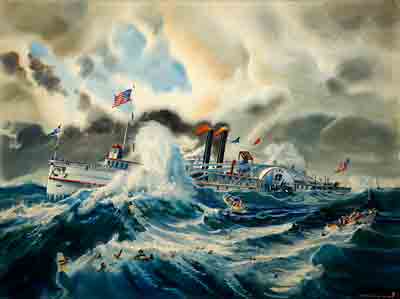
It is that time of year when the Cook family starts to remember a September night, now 160 years ago, the night that the family lost the matriarch of the family, a woman with a “great heart, strong intellect, the master mind, the loving, successful planner and leader, the pilot”1] of the family, Jane McGarvy Cook.
I have written twice before about that fateful night, [A Face to a Name, and September 6, 1860] but have yet to complete the story, so here it is, to the best of my knowledge, and with what I have discovered as of today, 5 Sep 2020.
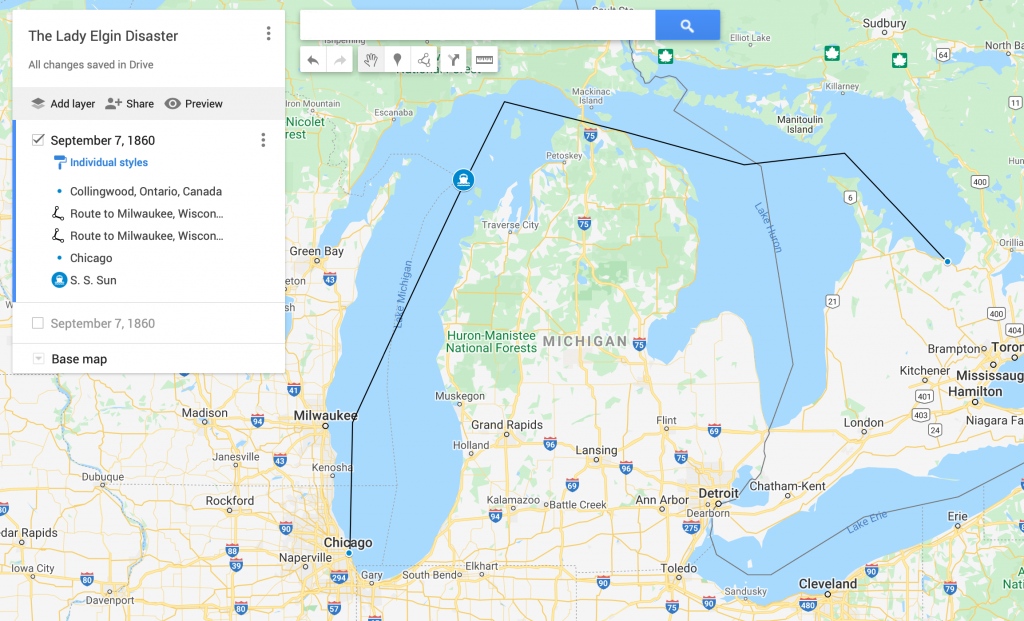
“The Cook money in Canada was due in August, 1860. It was planned that Mrs. [Jane McGarvy] Cook, one of the boys and a girl, should go to their old home on a visit and bring the wealth back to the new home, where it would soon be needed in meeting payments on the farms.” The farms were purchased in 1856, as “Mr. Cook bought one large farm for immediate use, making a considerable payment, and bargained for six others, a farm for each of the boys.. A payment was made on each of the additional farms.” And so plans were made that Jane would travel home to Canada where she “received it [the money] in gold–$12,000. It was a cumbersome package, but they preferred it that way to taking drafts.” 2] Family history tells us that she had sewn the coins into the hem of her dress in preparation for the journey home.
And so it was that Jacob Harrison Cook, age 19, the third son, and sixth born child to William Palmer and Jane McGarvy Cook, accompanied his mother back to their old home in Canada. Most likely they took the train to Milwaukee, and from there went by boat up around Michigan and on to Canada. It was a much anticipated visit, as Jane was looking forward to spending time with her 76-year-old mother, Elizabeth Eaken McGarvy, and her sister, Elizabeth McGarvy Watson. She would also be able to see her eldest son, William Charles, who had been working for his Uncle Jacob since the springtime, and prepare for her eldest Elizabeth Ann, to return to Wisconsin with them.
Relying on Jacob’s memory of the return trip 32 years after the event, 3] the family “took passage on a propeller from Collingwood, Ontario, Canada to Milwaukee. We arrived near Milwaukee in the night, and it was so cloudy and dark that the captain thought it would not be safe to attempt to land so we continued to Chicago, where we transferred to the first boat leaving for Milwaukee.” That boat was the steamer, the Lady Elgin, which began its return trip to Milwaukee, Milwaukee, Wisconsin around 11:00 p.m.
Leaving Chicago, the steamer headed north and had reached Winnetka, approximately 30 miles north of Chicago, traveling about nine miles from shore, when shortly after 1:00 a.m. it was hit by the schooner Augusta with such a great force that Jacob’s first thought was that the boat must have been struck by lightening. The Augusta had rammed bow first into the Lady Elgin’s side, sheering off one of her two 30-foot paddle wheels, then punched through the hull. Getting no signal of distress from the Lady Elgin, the Captain of the Augusta sailed on for Chicago. The crew of the Lady Elgin rushed to stuff mattresses into the hole, to throw all heavy objects overboard including a grand piano, and even to drive the 200 head of cattle kept below deck out into the churning waters, yet the water kept rushing in. “The creaking and grating of broken timbers, the solemn sound of the bell calling for help, the sound of distress from the whistle, which continued as long as there was enough steam to make a noise; all added to the horror of the situation.” 4]
A call was made for life preservers, both Jane and Elizabeth Ann were lucky to each receive one of these wooden preservers. Above all the noise and confusion Captain Wilson asked that all women come up to the hurricane deck. “The deck was soon crowded. A few moments later a monster wave struck the boat, breaking the iron rods that sustained one of the heavy smoke stacks. A flash of lightning followed, lighting the scene for an instant, and we saw the smoke stack fall across the deck, crushing, and burying several women beneath it.” Jacob recalls the last time that he saw his mother and sister, they were “sitting on the edge of the hurricane deck, strapped into their wooden preservers and waiting for the end, mother said that probably the boat was so near shore that it might not sink below the surface. Those were the last words I ever heard her speak for at that instant the boat went down,” 5] taking Jacob with it.
Again, in Jacob’s voice 32 years after the accident. “When I came up my hands touched something, which proved to be a piece of plank about eighteen inches wides by six feet in length. It was about 2 o’clock in the night when the boat went down and about 5 the next afternoon I drifted in near enough to the shore to reach the end of a pole held out to me by a man suspended by a rope in the hands of several others from the top of that high clay bank south of Racine.” 6]
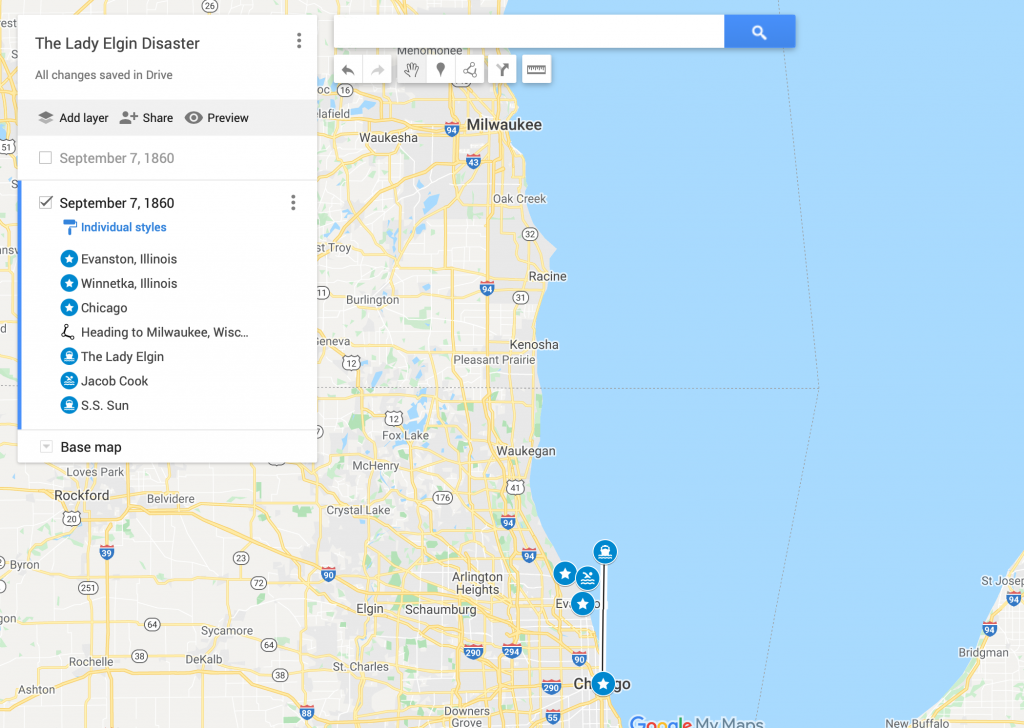
Captain Jack Wilson had not kept a list of the passengers he had aboard the steamer that ill-fated night, but it is estimated that there were over 400 people aboard when it went down in the stormy, choppy waters of Lake Michigan. On September 9th it was being reported that an estimated 287 people had been lost, 7] “sunk in the lake about twelve miles off Winetka, sixteen miles north of this city [Chicago].” “When our reporters reached Winetka, at 10 A. M., the surf was rolling in heavily, and breaking in thunder along the beach, the gale having risen to a fearful fury from the north east, and thus nearly on shore. The shore there is an uneven bluff ranging from thirty to sixty feet in height, with a narrow strip of beach at its base.”
“The whole beach for 8 miles we found strewed with fragments of the light upper portions of the ill-fated steamer, and out to sea where the waves were rolling more heavily then is usually seen even in our September gales, the surface of the angry waters for miles in extent, as far as the eye could reach sea-ward was dotted with fragments of the wreck, and rafts and spars, with what were clearly made out to be human beings clinging to them. 8]
“The shore was strewn with fragments of the wreck. Captain Wilson during the interval offered, caused all available portions of the upper works of the steamer to be cut away, and thus raft-material might be abundant when the steamer should go down. Bur for the high seas running, and as it was could there have been some means of rescue outside the hue of surf, the wisdom of Captain Wilson’s order would doubtless have saved his own brave life and those of many others now lost.” 9] “Had the accident occurred in a smooth sea, hundreds must have been saved who floated securely on rafts until they were carried into the breakers.”
“When the intelligence of the loss of the steamer…reached Milwaukee, like wildfire spread the news through the city. The telegraph and newspaper offices were thronged all day..the telegraph lines given up exclusively to dispatches concerning the disaster. 10]
How did the Cooks, waiting at home for the arrival of Jane, Elizabeth Ann and Jacob, hear of the news? I would assume (maybe wrongly) that the family was not aware that there had been a change in plans, and that they had not landed as expected in Milwaukee that Friday night. Did Jacob wire the news after he was finally rescued around 5:00 p.m. Saturday night? Or was the family already in Milwaukee, having ridden down on the train to meet them? We may never know.
The local newspaper, The Chilton Times, in 1860 was published each Saturday morning, and the news must have reached John P. Hume too late for publication in the September 8th edition. The following week, Mr. Hume did include the news, but by September 15th he deemed it second page news, and took his information from the Milwaukee News. On the third page, way down the column, under “Local Items,” he finally acknowledges that “…Among the victims who met with a watery grave were two from this county—Mrs. Cook and daughter of Stockbridge. Mrs. Cook with her son and daughter were on their way home from Canada at the time of the accident. The son after a hard struggle was saved but the mother and daughter perished.” 11] Am I judging this man too harshly when I say that I feel his delivery was a bit cold, and very uncaring?
The news did reach the Cook farm, and Watson accompanied his father to Milwaukee where they met Jacob, and the three continued on to Chicago. They were at the court house on Tuesday, September 11, when the Coroner’s Jury came in to session to assist the “eager crowd of mourners watching and waiting in the hope that each fresh arrival from the shore would bring them their own dead.” 12]
Here I will share in Watson’s own words what happened when they reached Chicago. He wrote the following words to his twin sister, Loretta Elliott from Fond du Lac, Fond du Lac, Wisconsin, on March 10, 1861.
“Oh, Dearest Sister I can’t begin to tell my feelings of our loved ones which we have lost God can only tell my feelings who ever nows the loss of a Mother but them that has the trile of loosing a kind and loving mother as ourn was, and a Dear sister as Lizabeth ann was Oh may God only save us from such deaths. Oh horrible horrible horrible was the site to se our Dear Sister when she was brought from the lake shore to the court house the in chicago the Bodies was laid a long in a row and our Dear sister a long with the rest there was some four or five woman laid together and Father Jacob and I looked at them and went a way satisfied that mother and sister wasent there, and the next day they was washed and put in coffins and we went and looked at them a gain and found our Dear sister Oh may heaven bless her soul and may good never permit me to se a nother such a site Oh it was awful to se the hundreds yes I may truly say thousands as there were rushing to get their lost wones I shall never forget the site before I left chicago you couldent harly tell wether they ware human beings or not I can never the them driven from my site Oh could I but tell you my feelings I would but pen ink and paper can never describe them, and Oh worse hits where is our mother Oh Dear Dear it seems at times as though it was but a dream and she would soon be home but no she has gone to her long home and that is in heaven and if we do but manage rite we will wone day meet her there where triles and troubles are no more, Oh if we could hae only buried her body what consolation it would have bin to us all. it has half kill paw he says if he could only get her body and have it buried decent he could rest a little easier, Oh if I was only there to night I could tell you all an awful long story but no I aint there I will tell you what I can in this and wen you rite a gain tell me what you are the most anxious to now and I will do the best I can in sending it to you all if there be eny thing in particular that uncle aunt or Gramother whishes to hear tell me and I will send it to them if I can Oh how I would like to se you all I dream often of you all being here and Oh how sad I feel when I se it isent only a dream-” 13]
Elizabeth Ann had drifted to the shore of Chicago and her body was recovered on September 11, 1860. She was one of 15 bodies recovered that day, and she received the number 19. The Press Tribune reported that the “Coroner’s Jury came in to session yesterday at 9 P.M. at the Court House, to resume their mournful duties over the ill-fated victims of the late calamity. The scenes throughout the day were of the most sad and affecting nature…” As Watson described in his letter to his sister, they did not recognize her the first day, but upon returning the next morning after she had been “washed” and put in a coffin, they found her. The newspaper goes on to report: “No. 19. Heretofore unknown, was identified this morning, by Jacob Cook, of Fond du Lac, as Eliza Ann Cook, of Stockbridge, Wis., who had been on a visit to Canada, and at the time of the accident was returning home. Trunk delivered to Jacob Cook.” 14] Jacobs voice tells us: “…we found, but could identify by a scar only, the body of my sister…” 15]
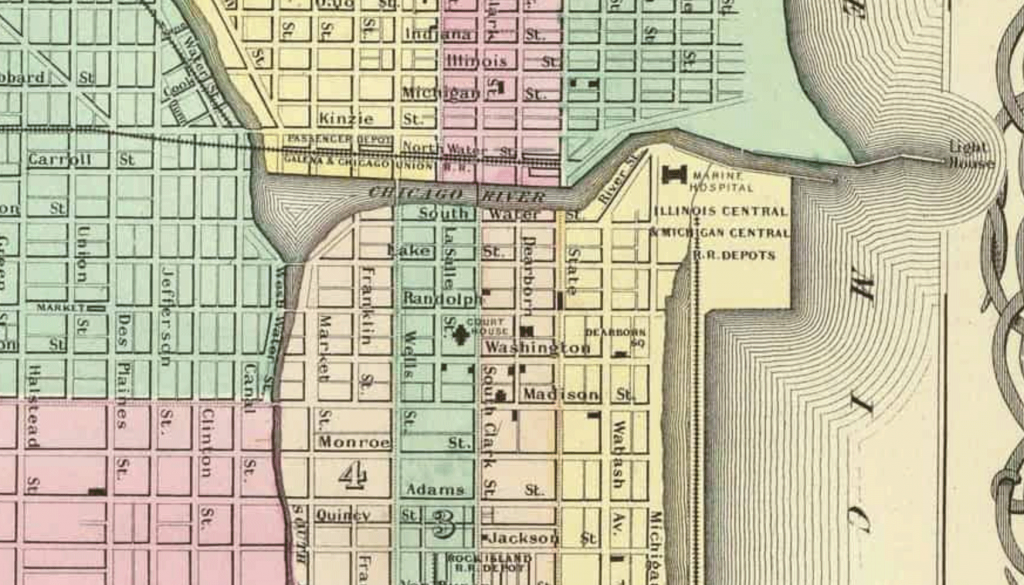
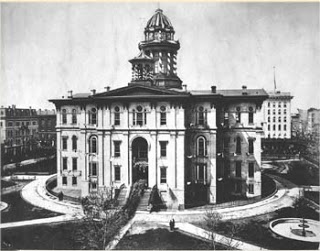
Watson gives no indication in his letter to his sister how long they stayed in Chicago, watching, waiting, each day heading to the Court House and scanning the bodies recovered that day. The numbers kept climbing, and by October 29th they had reached 160. 16] But inquests were not only being held in Chicago, as bodies continued to be recovered from other shorelines, including Kenosha, Kenosha, Wisconsin, Racine, Racine, Wisconsin, and the shores of Michigan. “The long and continued prevalence of northern and northeasterly winds has, within a short time past, brought to various points of the shore between Waukegan and Michigan City, a distance of about a hundred miles increased numbers of bodies of victims… The bodies now being found are much changed by advanced decomposition, and only recognizable, if at all, by fragments of clothing, jewelry, &c., adhering to them.” 17]
Searching through the inquests, I kept hoping to find a sign of Jane, much as William, Jacob and Watson must have searched each day, hoping to find their beloved wife and mother. On October 29th the Chicago Tribune reported that “At Winnetka, on Friday, an inquest was held on the body of a female, unknown, which came ashore at that place. It was very much decomposed, and only fragments of clothing adhered to it. Height five feet. A plain gold ring, taken from the third finger of the left hand, is in possession of John L. Wilson, at Winnetka. The body was interred at Rosehill, on Saturday.” 18] Could this be Jane? If she truly went down with $12,000 worth of gold sewn into her skirt hem, it seems likely that it would have taken time for the skirt to deteriorate to the point that it would set her free. We will never know.
NOTES:
- “Historical Sketch of the Cook Family,” The Marshfield News, 14 Apr 1910, Thursday, p. 1, col. 6; digital images, Newspapers.com (www.newspapers.com : accessed 12 Jan 2018).
- “A Memorable Time ~ Old Day-Events Are Recalled ~ Lieut. Col. J. A. Watrous of Milwaukee Writes for The Times of the Coming of the Cook Family to Stockbridge,” (Chilton) The Chilton Times, 19 Mar 1910, Saturday, p. 1, col. 2.
- “An Appleton Man’s Escape. His Mother and Sister Were Both Lost—The Former’s Body Never Recovered,” Milwaukee Sentinel, 4 Sep 1892.
- Ibid.
- Ibid.
- Ibid.
- “The Lake Michigan Calamity,” The Daily Exchange, 11 Sep 1860, p.1, co. 7; digital images, Newspapers.com (www.newspapers.com : accessed 4 Jul 2018.)
- “Awful Marine Calamity!,” The St. Joseph Traveler, 12 Sep 1860, Wednesday, p. 2; digital images, Newspapers.com (www.newspapers.com : accessed 22 Jul 2018).
- Ibid.
- Ibid.
- “Local Items” The Chilton Times, 15 Sep 1860, Saturday, p. 3, col. 1; digital images, Newspapers.com (www.newspapers.com : accessed 5 Jul 2018).
- “The Lady Elgin Calamity,” The Press Tribune, 13 Sep 1860, Thursday, p. 1, col. 4; digital images, Newspapers.com (www.newspapers.com : accessed 4 Jul 2018).
- Watson Henry Cook (Fond du Lac, Wisconsin) to Loretta Elliott, Letter, 10 Mar 1861; privately held by CaroleAnne Prentice Chepurny. Also: https://www.familysearch.org/tree/person/memories/KC97-CQL
- “The Lady Elgin Calamity,” The Press Tribune, 13 Sep 1860, Thursday, p. 1, col. 4; digital images, Newspapers.com (www.newspapers.com : accessed 4 Jul 2018).
- “The Loss of the Lady Elgin.” Cit. Date: 22 Aug 2008.
- “Inquests,” The Chicago Tribune, 29 Oct 1860, Monday, p. 1, col. 5, digital images, Newspapers.com (www.newspapers.com : accessed 5 Jul 2018).
- “The Lady Elgin Disaster–More Bodies Found,” The Chicago Tribune, 27 Oct 1860, Saturday, p. 1, col. 3; digital images, Newspapers.com (www.newspapers.com : accessed 5 Jul 2018).
- “Inquests,” The Chicago Tribune, 29 Oct 1860, Monday, p. 1, col. 5; digital images, Newspapers.com (www.newspapers.com : accessed 5 Jul 2018).
\
